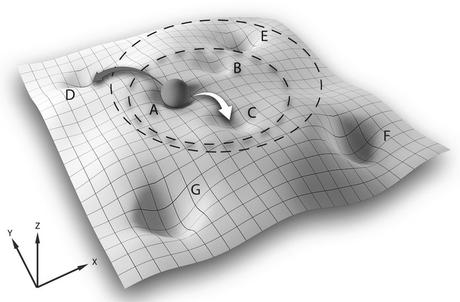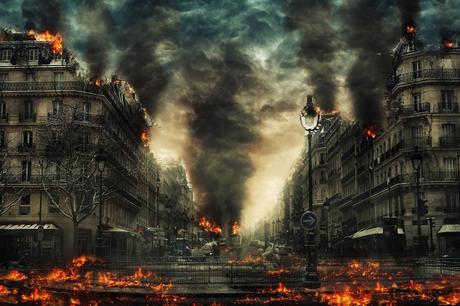The conservation, environment, and sustainability literature is rife with the term ‘collapse’, applied to concepts as diverse as species extinction to the complete breakdown of civilization. I have also struggled with its various meanings and implications, so I’m going to attempt to provide some clarity on collapse for my own and hopefully some others’ benefit.
 State transitions (Fig. 2 from Keith et al. (2015))
State transitions (Fig. 2 from Keith et al. (2015))From a strictly ecological perspective, ‘collapse’ could be described in the following (paraphrased) ways:
- abrupt transition of one ecosystem state to another, usually invoking the idea that something has declined in the process (species richness, beta diversity, functional diversity, trophic network connectance, trait volume, production, etc.);
- extinction of infrastructure/key species that then precipitates co-extinction cascades;
- variation in some ecosystem indicator beyond normal, long-term variation;
- some ecosystem indicator that is forced ‘outside a safe operating space‘;
- “a change from a baseline state beyond the point where an ecosystem has lost key defining features and functions, and is characterised by declining spatial extent, increased environmental degradation, decreases in, or loss of, key species, disruption of biotic processes, and ultimately loss of ecosystem services and functions“
- in fisheries, a sustained period of low catches following a period of high catches;
- “A theoretical threshold, beyond which an ecosystem no longer sustains most of its characteristic native biota or no longer sustains the abundance of biota that have a key role in ecosystem organization“
But there is still nor formal definition of ‘collapse’ in ecology, as identified by several researchers (Keith et al. 2013; Boitani et al. 2015; Keith et al. 2015; Sato and Lindenmayer 2017; Bland et al. 2018). While this oversight has been discussed extensively with respect to quantifying changes, I can find nothing in the literature that attempts a generalisable definition of what collapse should mean. Perhaps this is because it is not possible to identify a definition that is sufficiently generalisable, something that Boitani et al. (2015) described with this statement:
“The definition of collapse is so vague that in practice it will be possible (and often necessary) to define collapse separately for each ecosystem, using a variety of attributes and threshold values
Boitani et al. 2015
Despite all the work that has occurred since then, I fear we haven’t moved much beyond that conclusion.
Hell, cutting down the trees in the bush block next to my property constitutes a wholesale ‘collapse’ of the microcommunity of species using that patch of bush. An asteroid hitting the Earth and causing a mass extinction is also collapse. And everything in-between.
But at least ecologists have made some attempts to define and quantify collapse, even if an acceptable definition has not been forthcoming. The sustainability and broader environment literature has not even done that.
I often see written the term ‘societal collapse’ (or ‘collapse of society’) in many articles and books. Anyone familiar with this term probably has some gut-level notion of what this might mean. However, when you ask people to provide a definition, you get as many different versions as the number of people you ask.
Intuitively, ‘collapse’ is bad, and evokes mental images scraped from the apocalyptic category of popular movies (e.g., Mad Max, Blade Runner, 12 Monkeys, The Road, Children of Men, The Day After Tomorrow, et cetera ad nauseam …). Just substitute ‘collapse’ with ‘apocalypse’, and you get the general idea.
Jared Diamond famously defined societal collapse as “a drastic decrease in human population size and/or political/economic/social complexity, over a considerable area, for an extended time” in his 2005 book entitled Collapse. I think you’d agree that there is so much wiggle room within the criteria of this definition that does not provide a repeatable measure of ‘societal collapse’.

Diamond focussed largely on early societies that eventually ‘disappeared’, such as the Greenland Norse, Easter Islanders, and the Maya. But these are extreme examples of isolated populations that succumbed to environmental disasters, often exacerbated by over-exploitation.
Economists also use ‘collapse’ generally as “a breakdown of a national, regional, or territorial economy that typically follows a time of crisis, … [occurring] at the onset of a severe version of contraction [economy as a whole is in ‘decline’], depression [severe or prolonged downturn in economic activity], or recession [two consecutive quarters of decline in a country’s gross domestic product]“.
Political ‘collapses’ are also well-known, but they are equally ill-defined. The Soviet Union ‘collapsed’ into something else, Germany ‘collapsed’ after losing the Second World War, and Rwanda ‘collapsed’ into something else following the genocide in the 1990s. But Russia, Germany, and Rwanda still exist, just in different versions of their former selves.
While I will not endeavour here to try to solve the dilemma about inconsistent (impossible?) standardisation of the term ‘collapse’ in environmental writing, I do want to question the use of the term more generally. If ‘collapse’ cannot be defined robustly, or if it really depends on what you’re measuring or (worse), your particular ideology or subjectivity, perhaps we should exterminate it from our vocabulary?

KONICA MINOLTA DIGITAL CAMERA
" data-orig-size="3008,2000" sizes="(max-width: 1024px) 100vw, 1024px" data-image-title="KONICA MINOLTA DIGITAL CAMERA" data-orig-file="https://coreybradshaw.files.wordpress.com/2022/08/genocide.jpg" data-image-description="" data-image-meta="{"aperture":"2.8","credit":"","camera":"DYNAX 7D","caption":"KONICA MINOLTA DIGITAL CAMERA","created_timestamp":"1185964164","copyright":"","focal_length":"17","iso":"1600","shutter_speed":"0.025","title":"KONICA MINOLTA DIGITAL CAMERA","orientation":"0"}" data-medium-file="https://coreybradshaw.files.wordpress.com/2022/08/genocide.jpg?w=300" data-permalink="https://conservationbytes.com/2022/08/30/what-does-collapse-mean-and-should-we-continue-using-the-term/konica-minolta-digital-camera-2/" alt="" srcset="https://coreybradshaw.files.wordpress.com/2022/08/genocide.jpg?w=1024 1024w, https://coreybradshaw.files.wordpress.com/2022/08/genocide.jpg?w=2048 2048w, https://coreybradshaw.files.wordpress.com/2022/08/genocide.jpg?w=150 150w, https://coreybradshaw.files.wordpress.com/2022/08/genocide.jpg?w=300 300w, https://coreybradshaw.files.wordpress.com/2022/08/genocide.jpg?w=768 768w" class="wp-image-212798" data-large-file="https://coreybradshaw.files.wordpress.com/2022/08/genocide.jpg?w=510" />As with the larger terminological quagmires of specific disciplines (ecology included), a clear, quantifiable definition should be the norm for any such terminology, especially if it is used to evoke a severe decline in something.
But rather than use terms like ‘collapse’, ‘planetary boundaries‘, or ‘tipping points‘ without such clear definitions, perhaps we should avoid threshold-like language and quantify what is changing and the implications of said changes.
Being clear about what we mean will always have provide stronger foundation when arguing for positive change, because denialists will otherwise seize the ambiguity in an attempt to undermine your position.
CJA Bradshaw

